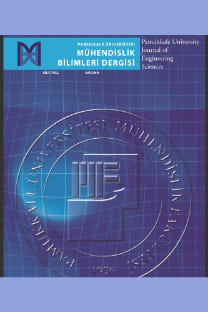0-1 problem uzayları için kuantum tabanlı yerel arama ile güçlendirilmiş parçacık sürüsü optimizasyonu
Metasezgiseller, Parçacık Sürüsü Optimizasyonu, 0-1 optimizasyon, Kuantum parçacıkları
A quantum based local search enhanced particle swarm optimization for binary spaces
___
- Goldberg DE. Genetic Algorithms in Search, Optimization, and Machine Learning. Reading, Massachusetts, USA, Addison-Wesley, 1989.
- Storn R, Price K. “Differential Evolution-A Simple and Efficient Adaptive Scheme for Global Optimization Over Continuous Spaces”. International Computer Science Institute, Muenchen, Germany, Scientific Report TR-95-012, ICSI, 1995.
- Eberhart RC, Kennedy J. “A new optimizer using particle swarm theory”. IEEE 1995 International Symposium on Micro Machine and Human Science, Nagoya, Japan, 4-6 October 1995.
- Karaboga D, Basturk B. “A powerful and efficient algorithm for numerical function optimization: artificial bee colony (ABC) algorithm”. Journal of Global Optimization, 39(3), 459-471, 2007.
- Yang XS. Firefly Algorithms for Multimodal Optimization. Editors: Watanabe O, Zeugmann T. Lecture Notes in Computer Sciences. 169-178, Berlin, Germany, Springer Heidelberg, 2009.
- Krishnanand KN, Ghose D. “Glowworm swarm optimization for simultaneous capture of multiple local optima of multimodal functions”. Swarm Intelligence, 3(2), 87-124, 2009.
- Yang XS. A New Metaheuristic Bat-Inspired Algorithm. Editors: González JR, Pelta DA, Cruz C, Terrazas G, Krasnogor N. Studies in Computational Intelligence. 65-74, Berlin, Germany, Springer Heidelberg, 2010.
- Yang X-S. Flower Pollination Algorithm for Global Optimization. Editors: Durand-Lose J, Jonoska N. Lecture Notes in Computer Science. 240-249, Berlin, Germany, Springer Heidelberg, 2012.
- Mirjalili S, Mirjalili SM, Lewis A. “Grey wolf optimizer”. Advances in Engineering Software, 69, 46-61, 2014.
- Wang GG, Deb S, Cui Z. “Monarch butterfly optimization”. Neural Computing and Applications, in press, 2015.
- Sun J, Feng B, Xu W. “Particle swarm optimization with particles having quantum behavior”. IEEE Congress on Evolutionary Computation, Portland, OR, USA, 19-23 June, 2004.
- Sun J, Xu W, Feng B. “A global search strategy of quantum-behaved particle swarm optimization”. IEEE Conference on Cybernetics and Intelligent Systems, Singapore, Singapore, 1-3 December 2004.
- Xi, M, Sun J, Xu W. “An improved quantum-behaved particle swarm optimization algorithm with weighted mean best position”. Applied Mathematics and Computation, 205(2), 751-759, 2008.
- Dong H, Yang X, Teng X, Sha Y. “A diversity reserved quantum particle swarm optimization algorithm for MMKP”. International Conference on Computer and Information Science, Okayama, Japan, 26-29 June, 2016.
- Banks A, Vincent J, Anyakoha C. “A review of particle swarm optimization. Part I: background and development”. Natural Computing, 6(4), 467-484, 2007.
- Banks A, Vincent J, Anyakoha C. “A review of particle swarm optimization. Part II: hybridisation, combinatorial, multicriteria and constrained optimization, and indicative applications”. Natural Computing, 7(1), 109-124, 2008.
- Kennedy J, Eberhart RC. “A discrete binary version of the particle swarm algorithm”. IEEE 1997 International Conference on Systems, Man, and Cybernetics, Orlando, FL, USA, 12-15 October 1997.
- Ozsoydan FB, Sipahioglu A. “Heuristic solution approaches for the cumulative capacitated vehicle routing problem”. Optimization, 62(10), 1321-1340, 2013.
- Pan QK, Tasgetiren MF, Liang YC. “A discrete particle swarm optimization algorithm for the no-wait flowshop scheduling problem”. Computers & Operations Research, 35(9), 2807-2839, 2008.
- Park JB, Jeong YW, Shin JR, Lee KY, Kim JH. “A hybrid particle swarm optimization employing crossover operation for economic dispatch problems with valve-point effects”. IEEE 2007 International Conference on Intelligent Systems Applications to Power Systems, Toki Messe, Niigata, Japan, 5-8 November 2007.
- Tseng CT, Liao CJ. “A discrete particle swarm optimization for lot-streaming flowshop scheduling problem”. European Journal of Operational Research, 191(2), 360-373, 2008.
- Marinakis Y, Marinaki M, Dounias G. “A hybrid particle swarm optimization algorithm for the vehicle routing problem”. Engineering Applications of Artificial Intelligence, 23(4), 463-472, 2010.
- Marinakis Y, Marinaki M. “A hybrid genetic-particle swarm optimization algorithm for the vehicle routing problem”. Expert Systems with Applications, 37(2), 1446-1455, 2010.
- Lian Z, Gu X, Jiao B. “A similar particle swarm optimization algorithm for permutation flowshop scheduling to minimize makespan”. Applied Mathematics and Computation, 175(1), 773-785, 2006.
- Zhang G, Dou M, Wang S. “Hybrid genetic algorithm with particle swarm optimization technique”. IEEE 2009 International Conference on Computational Intelligence and Security, Beijing, China, 11-14 December 2009.
- Su D, Xu W, Sun J. “Quantum-behaved particle swarm optimization with crossover operator”. IEEE 2009 International Conference on Wireless Networks and Information Systems, Shanghai, China, 28-29 December 2009.
- Kennedy J. Particle Swarm Optimization. Editors: Sammut C, Webb GI. Encyclopedia of Machine Learning. 760-766, US, Springer, 2011.
- Blackwell TM, Bentley PJ. “Dynamic search with charged swarms”. GECCO 2002 Genetic and Evolutionary Computation Conference, New York, USA, 9-13 July, 2002.
- Blackwell T, Branke J. Multi-Swarm Optimization in Dynamic Environments. Editors: Raidl G, Cagnoni S, Branke J, Corne D, Drechsler R, Jin Y, Johnson C, Machado P, Marchiori E, Rothlauf F, Smith G, Squillero G. Applications of Evolutionary Computing. 489-500, Heidelberg, Berlin, Germany, Springer, 2004.
- Blackwell T, Branke J, Li X. Particle swarms for dynamic optimization problems. Editors: Blum C, Merkle D. Swarm Intelligence. 193-217, Heidelberg, Berlin, Germany, Springer, 2008.
- Wang H, Wang D, Yang S. “A memetic algorithm with adaptive hill climbing strategy for dynamic optimization problems.” Soft Computing, 13(8-9), 763-780, 2009.
- Calderín JF, Masegosa AD, Pelta DA. “Algorithm portfolio based scheme for dynamic optimization problems”. International Journal of Computational Intelligence Systems, 8(4), 667-689, 2015.
- ISSN: 1300-7009
- Başlangıç: 1995
- Yayıncı: PAMUKKALE ÜNİVERSİTESİ
AEEE tahmini ve toplama noktalarının belirlenmesi: Çankaya Belediyesi için bir uygulama
Barış KEÇECİ, Orhan DENGİZ, Berna DENGİZ, Emre SÜMER, Aybüke KILIÇ, Ece ÇEKİ, Bedia İNAN, Selda ÇİÇEK
Mümin TUTAR, Hakan AYDIN, Ali BAYRAM
Sağlık hizmet süreçlerinin yalın düşünce aracılığıyla geliştirilmesi
Nurcan DENİZ, Feriştah ÖZÇELİK
Toprak kaynaklı ısı borularıyla kaldırımlardaki buzlanmanın önlenmesinin ısıl analizi
Hava filtresi içindeki akış ve titreşim deseninin karşılaştırılması- deneysel çalışma
Bir yem işletmesi için satış tahmin yöntemlerinin karşılaştırılması: Bir vaka çalışması
Bir iplik üretim tesisinde nitelik seçimi ve sınıflandırma ile iplik kalitesinin belirlenmesi
Pınar Zarif TAPKAN, Tayfun ÖZMEN
Tedarik zinciri risk yönetimi: Kavramsal çerçeve ve tedarik yönlü bir literatür araştırması
